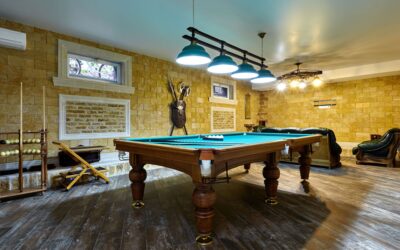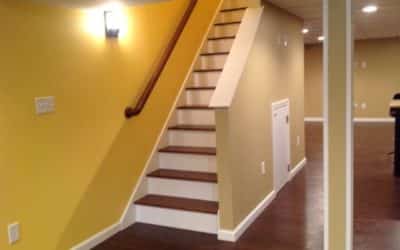A basement is considered a “wild card” when determining the value of a home. It’s at least a little logical to assume that finishing a basement can make one’s home more attractive to potential buyers and boost its evaluation from a real estate appraiser. But in light of the expenses and work it takes, does a
finished basement add value to appraisal?
The short answer: Yes, but…
Any renovations a homeowner makes to their house add value. Turning a bare basement into something useable for more than just storage will undoubtedly add some dollars to its resale cost. But how much value it adds is not an across-the-board proposition.
Improvements to the main, above-ground rooms in a house are far bigger drivers in home value than those made to basements. This stands to reason. With few exceptions, the bulk of actual living takes place in the living room, kitchen, above-ground bedrooms, and other parts of the main living space. Appraisers are always going to prioritize the value of the main floors of the house for that reason, even if it has a killer finished basement. Buyers will too.
But there are a few strategies and approaches home renovators can use on finishing the basement that can maximize what they can get from it, in terms of both price and quality.
Design the basement as close to the rest of the house as possible
Real estate appraisers consider a home’s gross living area in their assessments, which means they consider the total area of habitable above-grade space: the room in which residents live can conceivably live comfortably. This calculation almost always excludes below-grade basements, especially unfinished ones.
A finished basement is worth more if its appearance and feel align well with the rest of the home — that is, more tightly integrated with the general living area. If the basement’s at least partially above-grade (not entirely below the ground), is easily accessible to the rest of the house and surrounding yard and uses natural light from windows, it’s more livable and therefore more valuable.
Return on investment in a finished basement
The average cost of refinishing a basement can vary widely depending on whether it’s above-grade, style of construction, and the going rates in various parts of the country. At Better Built Basements in Connecticut, our basement finishing projects generally start at $30,000 and up. A homeowner can usually expect to recoup about 70% of the construction costs of a finished basement when their home is appraised or sold.
For that reason, it’s best to turn the finished basement into a room from which the homeowner gets some personal enjoyment. If it stands up to everyday use and offers an elevated level of satisfaction, the basement has a better chance of returning more on investment. There
are some buyers, after all, who are looking for a finished basement. Designing and building it so you or your family can get some quality time from it helps to convince buyers that it’s viable as a worthy addition to the main living space.
Tips for building a valuable finished basement
The best-case scenario for finishing a basement is if you’re not planning on selling it right away. You’ll probably be more inclined to make it an enjoyable living space and therefore a higher home value more possible. A few approaches and strategies to consider in the course of finishing your basement include:
- Checking local regulations. In almost all areas of the country, you’ll need a permit to build a finished basement. You may try to do it on the sly, but if you’re caught you may be assessed some heavy fines. Also, make sure to use contractors who are certified and insured.
- Establishing a purpose. Is your finished basement intended to be a rec room, man-cave, home office, or additional living area? If so, the priority is to make it fit with your overall lifestyle, comfort, and convenience. If you’re finishing the basement to make your home more attractive to eventual buyers, make it fit the context of the surrounding house as closely as you can. Modern buyers are fond of having an added or guest bedroom, so consider that a worthy approach.
- Designing a layout. Open floor plans are always more appealing to outside buyers. Basements usually have some built-in disruption to that open space, like water heaters, electrical boxes, and so forth. Keep an eye on your ceilings, too–pipes or ductwork might run at the top around the perimeter of the room. Plan your basement around those items.
- Making light a priority. Walk-out basements, meaning those with doors that lead directly outside or inside, may provide the opportunity to install windows that take advantage of natural light. That’s a big plus with most homebuyers. Consider recessed lighting if you have a more subterranean basement that offers little room for windows.
- Choosing the right flooring. Basements attract more moisture than other areas in the house. For that reason, natural flooring like hardwood might not be the best option, since it tends to bend and warp when subjected to long exposures of moisture. Easy-to-maintain carpets, high-quality vinyl, or extra hard materials can be solid choices for the floor of your basement.
- Testing for radon. Elevated radon levels, which are present in 1 of every 15 US homes, pose a significant cancer risk. Get a professional test before you build it. If the results are unfavorable, be prepared to set aside some budget for radon mitigation.
Thinking about renovating your basement? Better Built Basements is Connecticut’s #1 resource for
basement renovations. Our mission is to make your vision for your unfinished basement or home remodel come to life and be even more than you ever imagined it could be.
Contact us today to learn how we can take your basement from unfinished to unbelievable!



